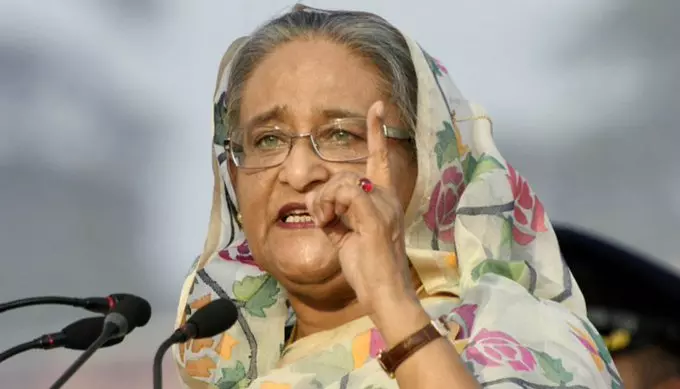
- Home
- India
- World
- Premium
- THE FEDERAL SPECIAL
- Analysis
- States
- Perspective
- Videos
- Sports
- Education
- Entertainment
- Elections
- Features
- Health
- Business
- Series
- In memoriam: Sheikh Mujibur Rahman
- Bishnoi's Men
- NEET TANGLE
- Economy Series
- Earth Day
- Kashmir’s Frozen Turbulence
- India@75
- The legend of Ramjanmabhoomi
- Liberalisation@30
- How to tame a dragon
- Celebrating biodiversity
- Farm Matters
- 50 days of solitude
- Bringing Migrants Home
- Budget 2020
- Jharkhand Votes
- The Federal Investigates
- The Federal Impact
- Vanishing Sand
- Gandhi @ 150
- Andhra Today
- Field report
- Operation Gulmarg
- Pandemic @1 Mn in India
- The Federal Year-End
- The Zero Year
- Science
- Brand studio
- Newsletter
- Elections 2024
- Events
- Home
- IndiaIndia
- World
- Analysis
- StatesStates
- PerspectivePerspective
- VideosVideos
- Sports
- Education
- Entertainment
- ElectionsElections
- Features
- Health
- BusinessBusiness
- Premium
- Loading...
Premium - Events

India gains if Bangladesh grows into an economic powerhouse but it simply cannot afford another failed state in the neighbourhood
Finally, the cat is out of the bag. After months of self-denial, Bangladesh has sought support from Saudi Arabia to tackle its serious foreign exchange crisis.
“We get 45 days to pay for fuel imports from Saudi Arabia. But due to the dollar situation, we told them that it would be good for us if they could give us a year," Salman F Rahman, the private industry and investment adviser to Prime Minister Sheikh Hasina, said after a three-day trip to the kingdom. "They (Saudi) said they will consider the matter."
Chinese help?
There are indications that if the energy prices get worse and money laundering continues unabated, Prime Minister Sheikh Hasina may seek Chinese help to shore its forex reserves, which in July 2022 stood at $20 billion but has now fallen below half that figure.
Rahman, whose Beximco conglomerate is seen as one of the worst bank defaulters and stands accused of extensive money laundering, has used his position as Hasina's adviser to not only deflect repayment calls by banks on his corporation but also secure an additional loan of 22,000 crore BDTaka before the January 2024 parliamentary elections.
Dollar shortage
That confirms the worst fears of Bangladesh businesspersons who have been running around banks seeking to open Letters of Credit for critical imports and facing continuous refusal — that "dollars are more difficult to find than a passage to heaven" as one baby food importer, Khalil Ahmed, said.
"Why can't Hasina take the services of a solid economist of integrity and competence to handle her finances rather than employ controversial figures like Salman Rahman," asked a top garment exporter who did not wish to be named for fear of vendetta. "The Rahmans are the problem and not the solution to our crisis."
Worsening crisis
The Hasina government has said that Bangladesh's foreign exchange reserves stood at $17.20 billion at the end of December 2023, falling short of the relaxed target of a minimum of $17.78 billion set by the International Monetary Fund (IMF). But the situation since then has got worse and the reserves have reportedly dropped below the $15 billion mark.
The IMF had approved a $4.7-billion loan for Bangladesh in January last year and fixed a minimum forex reserve, also called the Net International Reserve (NIR), of $26.81 billion by December 2023 end. That target was later relaxed to $20.11 billion for June.
IMF approached
The IMF’s willingness to support Bangladesh’s request for a $4.5-billion bailout package over the next three years confirms that the country’s economy is facing a serious crisis.
It is the third country in the region, after Sri Lanka and Pakistan, that has knocked on the door of the IMF in recent months. "While the economic crises in Pakistan and Sri Lanka were widely reported in international media, Bangladesh’s situation flew under the radar for quite some time thanks to the government’s repeated denial of any impending crisis," says Bangladesh expert Ali Riaz. "Prime Minister Hasina’s government — for years — touted the economic success of the country and recently celebrated the opening of Bangladesh’s largest bridge as a symbol of its self-reliance."
The reality
The government claims that its request for “budget support,” an unrestricted loan with low interest which allows it to use the money as it wishes, is a pre-emptive measure and that the economy is not, in fact, in trouble. This, says Riaz, "could not be further from the truth."
Dhaka’s search for financial support is not limited to the IMF. Besides requesting the World Bank for a $1-billion loan, an estimated $2.5-3 billion have been solicited from several multilateral agencies and donor nations (such as the Japan International Cooperation Agency) just this year.
Doubtful claims
Considering that ongoing austerity measures, including power cuts, restricted use of foreign currency, and fuel rationing, are yet to make any major dent in the crisis, the government’s claim — that the country will weather shrinking foreign exchange reserves, a growing trade deficit, record inflation, daily depreciation of the local currency, and an intense energy crisis — is doubtful.
The Hasina government has argued that the economic slowdown from the Covid-19 pandemic and the global impact of the Ukraine-Russia war are to be blamed for its current plight. But this only tells a part of the story. The following statistics paint a far more worrisome picture:
Taking loans
Bangladesh received at least $1.7 billion in loans from multilateral agencies by June 2020, and by October 2021, it had borrowed at least $3 billion from development partners as budget support to combat the adverse impact of the pandemic. It is reported that budget support received from various multilateral agencies between 2019-20 and 2021-22 amounted to $5.8 billion.
Dhaka received $732 million from the IMF as a balance of payment support and $1.4 billion from the World Bank to implement the countrywide vaccination programme. It obtained 61 million doses of Covid-19 vaccines from the United States, free of cost.
Root causes
The government also offered various stimulus packages and repeatedly claimed that its economy had not only turned around but was on the road to a dramatic recovery. The optimism was echoed by the World Bank. Bur more than external factors, the present crisis has been due to government policies — or the lack of a firm policy in tackling bank defaults and money laundering.
Ali Riaz identifies five reasons for this phenomenal downward dive of the Bangladesh economy.
* High cost of infrastructure projects, often described as “mega projects”
* Crisis in the banking sector due to widespread default of loans
* Waste of resources in the energy sector
* Capital flight
* Unsustainable infrastructure spending
Signature projects
Since coming to power in 2009, the Hasina government has undertaken several large infrastructure projects funded by various countries and multilateral agencies. These projects include the Padma Bridge, a nuclear power plant in Rooppur, the Dhaka City Metro Rail, and the Karnaphuli Tunnel, to name a few.
The Padma Bridge, one of the largest projects in the country, cost about $3.6 billion, up from the estimate of $1.16 billion in 2007. The ambitious nuclear power plant is costing Bangladesh $12.65 billion, and the actual amount to be spent will not be known until it is commissioned. The Metro Rail project ballooned to $3.3 billion from its original estimate of $2.1 billion. The cost of the underwater Karnaphuli Tunnel reached $1.03 billion, though originally it was estimated at $803 million. "Unfortunately, these are not exceptions, but patterns," says Riaz.
Endemic corruption
In 2017, the World Bank noted that the cost of road construction in Bangladesh was the highest in the world. The cost overrun is largely because of overpricing of materials, corruption, and long delays.
Bangladesh's banking sector has been crippled by large scams and non-performing loans secured by dubious businesspersons with political clout who pay important politicians to keep the banks off their backs.
Writing off loans
In 2019, when the Central Bank claimed that the total amount of defaulted loans was $11.11 billion, the IMF disputed this, saying the true amount is more than double. The current official figure has been challenged by many. And instead of chasing defaulters, the Hasina government has hidden bad loans through write-offs explained as restructuring and by changing the official definition of “bad loans” to dodge regulations.
Corruption watchdog Transparency International Bangladesh said that “immense political pressure and illegal intervention by some large business groups” are the causes of an unabated increase in loan defaults.
Weak central bank
This is not a new phenomenon. Although experts have been warning of such a situation for years, the Bangladesh Bank has not taken effective steps but has been changing policies to help the loan defaulters.
In March 2022, the government celebrated its success in extending electricity coverage to the entire country. This, however, came at a high price.
Power sector
The associated increase in electricity generation was largely due to the establishment of Quick Rental Power Plants (QRPPs) in the private sector. In 2009, it was said that these units were stop-gap measures until a comprehensive, long-term solution was found. Increasingly, though, these units have become the mainstay of electricity generation, and not without suspicious beneficiaries.
In the past decade, the power sector received huge subsidies — between 2010 and 2021, the Power Development Board got $7.1 billion while the Bangladesh Petroleum Corp received $3 billion between 2010 and 2015. Notably, this occurred while the prices of electricity and fuel were hiked for consumers.
Money laundering
These units are owned by companies connected to the government, which are milking the system to their benefit. Twelve companies received $5.5 billion in the past decade as capacity charges. Additionally, the government has signed agreements with Indian energy company Adani Power, which would require Bangladesh to pay $423.29 million annually and $11.01 billion over its lifetime of 25 years as capacity for its energy supply.
In the past decade, as rampant corruption allowed a small group of people to amass large sums of money, Bangladesh witnessed widespread money laundering, according to watchdog Global Financial Integrity. Between 2009 and 2018, $8.27 billion was siphoned annually through mis-invoicing of the values of import-export goods. The growth of deposits by Bangladeshis in Swiss banks in the past decade is indicative of capital flight. In 2021, it increased by 55.1 percent, reaching 871 million Francs ($912 million).
These factors have contributed immensely to the unprecedented crisis Bangladesh is facing. The global situation has only aggravated it beyond the threshold of an impending collapse.
India’s dilemma
The Narendra Modi government in India has strongly backed Hasina in the face of sustained Western pressure to hold fair elections to the extent of facing charges of backing the 77-year-old increasingly autocratic prime minister's sure steps towards turning Bangladesh into a police state. Hasina has delivered on India's security and connectivity concerns but refused to heed Delhi's pressure to handle the economy more efficiently by appointing specialist domain experts of integrity as ministers and drop the likes of Salman Rahman.
India gains if Bangladesh grows into an economic powerhouse because that rubs on positively on its eastern and north-eastern states but it simply cannot afford another failed state in the neighbourhood.
(The Federal seeks to present views and opinions from all sides of the spectrum. The information, ideas or opinions in the article are of the author and do not necessarily reflect the views of The Federal.)


